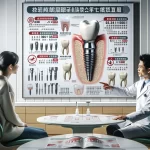Getting dental implants can be a transformative experience, restoring your smile and boosting your confidence. However, the success of this procedure heavily relies on proper post-operative care, especially in following specific dietary guidelines. A crucial recommendation is to avoid consuming dairy products immediately after dental implant surgery. In this article, we’ll explore the reasons behind this advice and provide you with a comprehensive guide to support your recovery journey.
Understanding the Healing Process of Dental Implants
Dental implant surgery involves placing a titanium post into your jawbone, which serves as an artificial tooth root. Over the next several months, a process called osseointegration occurs, where the implant fuses with the surrounding bone, creating a sturdy foundation for the crown that will be placed on top.
During this critical healing phase, it’s essential to create an environment that promotes optimal healing and minimizes the risk of complications. This is where avoiding dairy comes into play.
The Risks of Consuming Dairy After Implant Surgery
While dairy products are often praised for their nutritional benefits, they can potentially hinder the healing process after dental implant surgery. Here are the primary reasons why you should steer clear of dairy during the initial recovery period:
Increased Risk of Infection
Dairy products, especially milk, contain certain proteins that can increase mucus production in the mouth and throat. This excess mucus can create a breeding ground for bacteria, increasing the risk of infection at the surgical site. For more information on infection risks after dental procedures, visit American Dental Association.
Potential for Irritation and Discomfort
Consuming dairy products immediately after surgery may cause discomfort and sensitivity due to their texture and temperature. Imagine pouring cold milk over a fresh wound; it would likely sting and cause further irritation. The same concept applies to your healing implant site.
Interference with Blood Clot Formation
For your implant to heal properly, a blood clot needs to form at the surgical site. This clot protects the area and provides a scaffold for new tissue growth. Some components in dairy products, such as lactose or casein, might interfere with the formation or stability of this crucial blood clot.
Increased Inflammation
Dairy products contain saturated fats that have been shown to trigger inflammation in the implant site. Excessive inflammation can lead to infection, potentially compromising the success of the implant and delaying the healing process.
Recommended Diet After Dental Implant Surgery
So, what can you eat during the initial healing phase? Here are some guidelines:
- Stick to a Liquid Diet: For the first 24-48 hours post-surgery, focus on liquids before gradually introducing more substantial foods as tolerated.
- Focus on Nutrient-Rich Options: Choose smoothies, protein shakes, pureed soups, and scrambled eggs to ensure you’re getting essential nutrients without compromising your healing.
- Stay Hydrated: Drink plenty of water and herbal teas while avoiding carbonated and alcoholic beverages.
- Explore Dairy Alternatives: After a few days, consider incorporating non-dairy alternatives like almond milk or coconut milk for added calcium and nutrition without the risks associated with dairy.
As you progress in your recovery, pay attention to your body’s signals and follow your dentist’s specific instructions. For dietary advice tailored to your recovery process, refer to Mayo Clinic.
Maintaining Oral Hygiene After Implant Surgery
In addition to watching your diet, practicing good oral hygiene is crucial for successful implant integration. Here are some tips:
- Gently Rinse: Use warm salt water or a prescribed mouthwash to keep the surgical site clean.
- Brush Carefully: Avoid brushing directly over the implant area for the first few days.
- Attend Follow-Up Appointments: Regular check-ups with your dentist are essential for monitoring your healing progress.
Key Takeaways
- Avoiding dairy immediately after dental implant surgery can reduce the risk of infection, irritation, and interference with blood clot formation.
- Stick to a soft food diet rich in nutrients to support healing.
- Maintain good oral hygiene practices through gentle rinsing and careful brushing.
- Follow your dentist’s specific instructions and attend all follow-up appointments.
By understanding why it’s important to avoid dairy after dental implant surgery and how dietary choices impact healing, you empower yourself to make informed decisions about your dental care. This knowledge not only aids in a smoother recovery but also contributes to long-lasting results that enhance your quality of life. Embrace this journey towards better oral health with confidence!
What Are the Main Types of Dental Implants?
The two primary types of dental implants are endosteal and subperiosteal. Endosteal implants are placed directly into the jawbone and are the most common type. Subperiosteal implants, on the other hand, are situated on or above the jawbone, typically used when the jawbone isn’t adequate to support endosteal implants. Understanding the difference is crucial for those considering dental implants. For more information, check out our detailed explanation in Types of Dental Implants.
Why Should Dairy Products Be Avoided After Dental Implant Surgery?
Post-dental implant surgery, it’s often recommended to avoid dairy due to the risk of bacterial growth and potential infections, the possibility of exacerbating inflammation, and the chance of allergic reactions. Dairy products, particularly those high in sugar or fat, can hinder the healing process. Learn more about this dietary recommendation in our article, Why No Dairy After Dental Implant Surgery.
How Long Does It Take to Recover from Dental Implant Surgery?
The recovery time after dental implant surgery varies depending on the individual and the complexity of the procedure. It can range from a few days to several months for the implant to fully integrate with the jawbone. Adhering to post-operative instructions, including diet and oral hygiene, is key to a successful recovery. For detailed recovery guidelines, refer to Recovery and Care After Dental Implant Surgery.
What Foods Should I Eat During Recovery from Dental Implant Surgery?
After your surgery, focus on soft, nutrient-dense foods that are gentle on your mouth. This includes items like mashed potatoes, cooked vegetables, soft fruits, and yogurt. It’s also important to stay hydrated and avoid hard, crunchy, or sticky foods. For a comprehensive list of recommended foods, visit Best Foods for Dental Implant Recovery.
Can I Resume Normal Oral Hygiene Practices After Dental Implant Surgery?
Post-surgery, it’s important to maintain oral hygiene to prevent infections and aid healing. However, you should be gentle around the surgical site. Use a soft-bristled toothbrush and avoid vigorous rinsing. Your dentist will provide specific instructions on oral care post-surgery. For general tips on dental implant care, explore Dental Implant Care 101.







